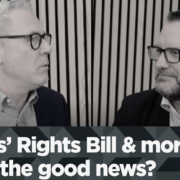Annual house price growth edged down to -3.8% in July. This was the weakest outturn since July 2009, although it is only modestly lower than the -3.5% recorded last month.
There was a slight fall of 0.2% over the month, after taking account of seasonal effects. As a result, the price of a typical home is now 4.5% below the August 2022 peak.
Investors’ views about the likely path of UK interest rates have been volatile in recent months, with the projected Bank Rate peak fluctuating between 5% in mid-May and 6.5% in early July.
There has been a slight tempering of expectations in recent weeks but longer-term interest rates, which underpin mortgage pricing, remain elevated, commented Robert Gardner, Nationwide’s Chief Economist.
As a result, housing affordability remains stretched for those looking to buy a home with a mortgage. For example, a prospective buyer, earning the average wage and looking to buy the typical first-time buyer property with a 20% deposit, would see monthly mortgage payments account for 43% of their take home pay (assuming a 6% mortgage rate), Gardner continued.
This is up from 32% a year ago and well above the long-run average of 29%. Moreover, deposit requirements continue to present a high hurdle – with a 10% deposit equivalent to 55% of gross annual average income.
This challenging affordability picture helps to explain why housing market activity has been subdued in recent months.
There were 86,000 completed housing transactions in June, 15% below the levels prevailing the same time last year and around 10% below pre-pandemic levels.
More timely mortgage approval data showed a slight increase in activity in June, though most of these applications will pre-date the more recent rise in longer term interest rates.
Moreover, activity is still c20% below 2019 levels.
Nevertheless, a relatively soft landing is still achievable, providing broader economic conditions evolve in line with our (and most other forecasters) expectations.
In particular, unemployment is expected to remain low (below 5%), and the vast majority of existing borrowers should be able to weather the impact of higher borrowing costs, given the high proportion on fixed rates, and where affordability testing should ensure that those needing to refinance can afford the higher payments.
While activity is likely to remain subdued in the near term, healthy rates of nominal income growth, together with modestly lower house prices, should help to improve housing affordability over time, especially if mortgage rates moderate once Bank Rate peaks, Gardner concluded.
| Headlines | Jul-23 | Jun-23 |
|---|---|---|
| Monthly Index* | 516.6 | 517.8 |
| Monthly Change* | -0.2% | 0.1% |
| Annual Change | -3.8% | -3.5% |
|
Average Price (not seasonally adjusted) |
£260,828 | £262,239 |
Tom Bill, head of UK residential research at Knight Frank, comments:
“Higher borrowing costs have knocked sentiment and forced buyers to recalculate their budgets but the property market hasn’t slammed on the brakes.
The bank rate is nearing its peak, which means that while sentiment will remain subdued, it will only improve in the second half of this year. That said, prices and sales volumes will come under pressure as the market descends from the highs of the pandemic and adjusts to the new lending environment.
While we expect UK prices to fall by 5% this year, demand should prove more resilient than expected between now and the general election given the cushioning effect of wage growth, high levels of housing equity, lockdown savings, the availability of longer mortgage terms, forbearance from lenders and the popularity of fixed-rate deals in recent years.”
Jeremy Leaf, north London estate agent and a former RICS residential chairman, comments:
“These figures are a little disappointing considering they are reflecting what was happening in the early to middle part of this year when we saw a rebound in sales before mortgage rates rose significantly.
However, Nationwide’s data, though comprehensive and widely respected, can only cover activity of its customers and won’t include the cash buyers who have been dominating the market recently, trying to take advantage of more favourable prices.
Clearly, the softening that we have seen in recent months in our offices can take up to a year to show itself in the figures so it may be some while yet before marked differences emerge.”
Mark Harris, chief executive of mortgage broker SPF Private Clients, comments:
“Until we see a consistent decline in mortgage pricing, buyers relying on mortgages are likely to be more price sensitive in coming months on the back of affordability concerns.
With another 25 basis points interest rate rise expected from the Bank of England later this week, we are not out of the woods just yet when it comes to rising mortgage costs.
However, a few lenders, including HSBC, Barclays and Nationwide, have reduced their fixed-rate mortgage pricing on the back of better-than-expected inflation news.
This has led to a calming of Swap rates, which underpin the pricing of fixed-rate mortgages, after weeks of considerable volatility.”
Anna Clare Harper, CEO of sustainable investment adviser GreenResi, comments:
“This house price correction reflects reduced demand and the urgency of supply.
On demand, the combination of reduced stamp duty and lower interest rates through Covid boosted people’s ability to pay higher prices.
Now, higher interest rates, and the end of the stamp duty holiday mean people are no longer willing and able to pay higher house prices.
On supply, higher interest rates also influence sales prices. For approximately 2 million property owners with variable-rate mortgages or fixed-rate terms coming to an end this year, housing costs are increasing by 2 to 3 times.
For those who can’t afford this, a sale at any price is needed, bringing down the average house price.
Both homeowners and renters are struggling to afford the costs of housing.
In some cases, mortgage costs are increasing above their salaries, with profound impacts on quality of living, not to mention consumer spending, which is an important component of economic growth, and house prices.”
Tomer Aboody, director of property lender MT Finance, comments:
“The declining number of transactions, combined with negativity in the market, is pushing down property prices, a trend which has been evident for several months.
The constant interest rate increases are making affordability difficult for buyers, as they try to make moves, with many waiting until some stability comes in.
With some better news on inflation recently, it will be interesting to see whether the Bank of England postpones the next rate rise or goes for a slight increase, giving the market some breathing space to adjust.”
Director of Benham and Reeves, Marc von Grundherr, comments:
“We’ve seen inflation ease in recent weeks, however, interest rates and the resulting cost of borrowing remain high and this is continuing to dampen buyer appetites, which in turn is impacting house prices.
While we don’t anticipate any notable correction on the horizon, we expect these lethargic market conditions to remain in the short-term, until such time the cost of climbing the ladder starts to reduce.”
Managing Director of Barrows and Forrester, James Forrester, comments:
“A gloomy market outlook on the face of it, but rather than entering a deep freeze, it’s fair to say the market is thawing.
Yes, affordability remains an issue, however, just this week we’ve seen a big spike in mortgage market activity, which suggests that an uplift in house prices is just around the corner.
As interest rates begin to reduce, this growing market momentum will start to snowball and this will reverse the downward house price trends of recent months.”
Managing Director of House Buyer Bureau, Chris Hodgkinson, comments:
“The weakest level of annual house price growth since July 2009 is sure to cause alarm for the nation’s home sellers and many will be keen to sell their home quickly before the rot sets in any further.
The good news is that we’re not in the midst of a market crash, albeit we are seeing a downward correction.
However, the real challenge at present is the heightened level of market instability, the ability to actually find a buyer in a proceedable position and, once you have, making it through to completion without the transaction falling through.”
CEO of Octane Capital, Jonathan Samuels, comments:
“The current market outlook isn’t quite as turbulent as today’s house price figures may suggest and, in fact, we’ve seen a boost to market sentiment in the form of mortgage approval activity outperforming wider expectations.
While this increase in buyer appetites will take some time to filter through to top line house price growth, it’s certainly an early sign that the worst is behind us.”























Comments